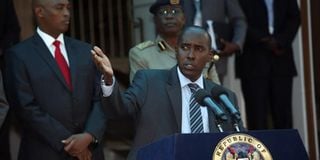Insecurity must not be allowed to compromise our economic activity

Interior Cabinet Secretary Joseph ole Lenku addresses journalists at Harambee House in Nairobi on June 16, 2014. "The Mpeketoni attack has set off a divisive debate, after Cabinet Secretary Joseph ole Lenku, then later, President Kenyatta said it was the work of 'local politicians'". PHOTO | EVANS HABIL
What you need to know:
- Clearly, this country has a serious paucity of statesmen. Our politicians are more concerned about votes than with the welfare of the people, more interested in the short-term prospects of their own political parties than the long-term future of the country.
- We must not forget that Lamu occupies a special place in our ambitions to open a second transport corridor to link us with Southern Sudan and Ethiopia.
My brief in this column is to comment on economic issues. And there are many topical economic issues deserving of mention right now — the Eurobond, the just published Budget for the current financial year, public debt, new taxes — the list is endless.
Yet I think that I will be burying my head in the sand if I do not comment on the killings in Mpeketoni, Lamu County.
Public faith in the security institutions in this country has been violently shaken. We forget that faith in security institutions, though an intangible factor, is a very valuable national asset.
We have been left wondering whether the expansive security infrastructure we have is just an expensive superfluity.
Indeed, it is a statement on the ineffectiveness of our security apparatus that the gunmen were allowed the time and space on Sunday to engage in a killing spree for several hours.
The orgy of killing went on for five hours before the police came into the picture.
The second attack on Monday is what has exposed the security institutions as being completely out of touch with the security dynamics in Lamu. After the Monday attacks, you would have expected the police to have moved swiftly and decisively to the ground in pursuit of the attackers.
A SECOND ATTACK
Yet, with all the security top dogs, including the Internal Security minister and the Inspector General of Police, in Lamu, presumably on a mission to pursue and arrest the killers, you would have assumed that the region was going to enjoy momentary peace, even for one week.
The following day, the killers launched a second attack in the same area, killing another 15 people.
To the political elite, this is an ideal time to score propaganda points and open another round of apportioning blame.
Clearly, this country has a serious paucity of statesmen. Our politicians are more concerned about votes than with the welfare of the people, more interested in the short-term prospects of their own political parties than the long-term future of the country.
Whether the killings were conducted by Al-Shabaab or local community leaders engaged in a campaign of ethnic cleansing is irrelevant.
In order to restore public faith in the security apparatus, the citizens of this country want to see arrests and prosecutions of the perpetrators of the killings in Mpeketoni.
Now the government says it had the intelligence about the killings long before they happened and that the attacks were planned by local leaders. Therefore, it should not be difficult to apprehend the masterminds.
We must not forget that Lamu occupies a special place in our ambitions to open a second transport corridor to link us with Southern Sudan and Ethiopia.
TAKE FULL ADVANTAGE
We are planning a new railway, a new port, a resort city, a crude oil refinery, and new roads under the so-called Lapsset projects.
We need a second transport route other than the Northern Corridor that starts from the port of Mombasa to Malaba on the border with Uganda and on to central Africa.
We are in the middle of constructing three berths for bulk and general cargo and a container terminal.
A second route will take away the pressure from the overcrowded Northern Corridor.
In the future, I see Lamu quickly emerging as the region’s largest oil-exporting port, handling exports from Uganda, Southern Sudan, and Turkana County.
We must also not forget that the Southern Sudanese are planning to build their own pipeline through North Eastern Province to Lamu. We have signed a memorandum of understanding committing us to run the proposed pipeline from Lamu on their behalf.
We must take full advantage of the tensions between Juba and Khartoum over sea routes, not only to boost our geostrategic significance as the hub of economic activity in the region, but also to achieve our dream of acquiring a second transport and economic corridor.





